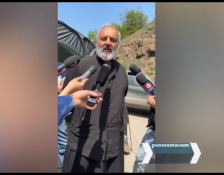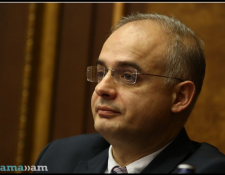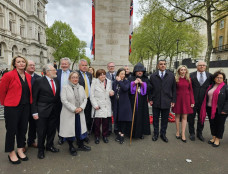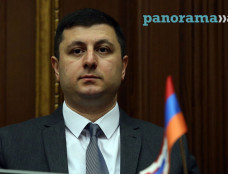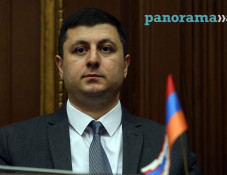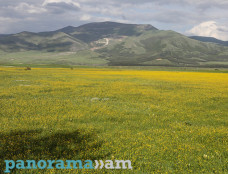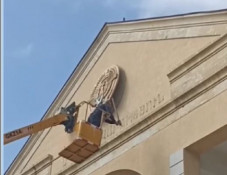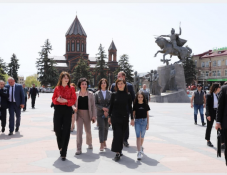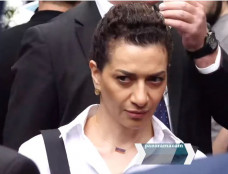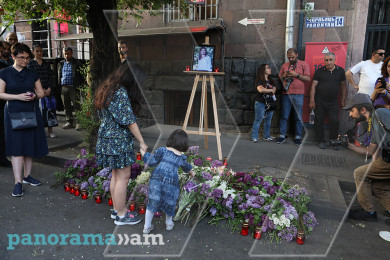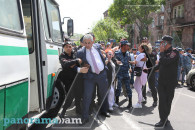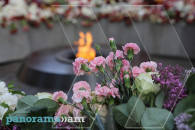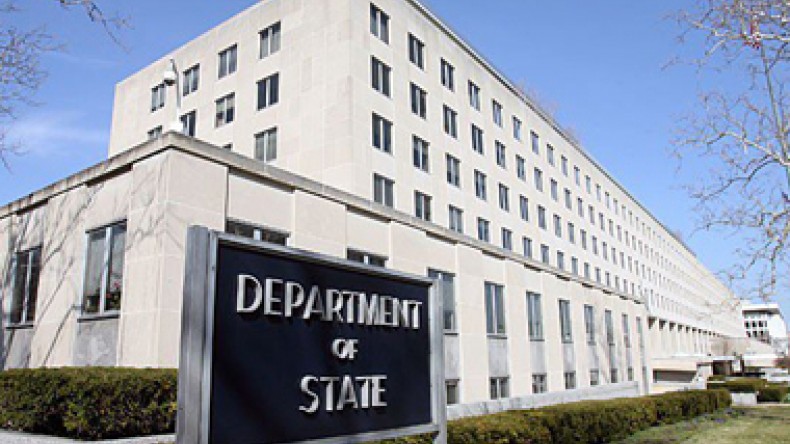
US Department of State: Sexual abuse widespread in Azerbaijani army, tortures in prisons, foreigners’ communications monitored
On 25 June 2015, the US Secretary of State John Kerry introduced the Country Reports on Human Rights Practices for 2014 where the Department of State analyses the human rights situation in different spheres in Azerbaijan, among others. The report is published on the US Department of State website.
According to the report, physical abuse of soldiers remained a problem in the military and at times resulted in death. As of November 1, 2014, local human rights organizations reported at least 75 deaths in the military, of which 48 were not combat-related, including suicides and soldiers killed by fellow service members. Impunity for abuses continued. Local observers reported widespread bullying and abuse in military units, including physical and sexual abuse.
Domestic human rights monitors reported receiving 324 complaints of abuse of detainees by security forces during the year (including reported instances of torture). In four cases torture reportedly led to death. Reports indicated that most mistreatment took place while detainees were in police custody. Reports continued that authorities at times used torture or other abusive methods to coerce confessions. For example, on August 11, 2014, Ministry of Interior officials reportedly beat Murad Adilov, a member of the opposition Popular Front Party and brother of the party’s spokesperson, journalist Natig Adilov, to try to force him to confess to narcotics possession after police allegedly found drugs in his possession and at his parents’ home, according to the report.
Efforts to coerce confessions reportedly at times included threats of rape. Human rights defender Leyla Yunus reported that authorities subjected her and her husband, Arif Yunusov, to threats of rape and sleep deprivation and otherwise mistreated them while they were in official custody. Kurdakhani detention facility warden Major Yagubov threw her on the floor, pulled her hair, and beat her in the kidneys. Her attorneys also stated that authorities refused to investigate physical abuse by her cellmate or to separate her from her cellmate, the report reads.
There were also allegations of mistreatment of seven members of the N!DA youth movement and Free Youth activist Ilkin Rustamzade. On April 1, 2014, the activists reported that detention facility personnel released tear gas inside a closed transport vehicle as they shuttled the group from the court to the detention facility. Authorities reportedly maintained a de facto ban on independent forensic examinations of detainees who claimed mistreatment, according to the Department of State report.
It is pointed in the report that prison conditions were harsh and at times life threatening. Overcrowding, inadequate nutrition, deficient heating and ventilation, and poor medical care combined to make the spread of infectious diseases a problem in some facilities. The Ministry of Justice reported 104 deaths in ministry facilities, 79 of which occurred in medical treatment facilities in 2014. While the Ombudsman’s Office reported systematic visits and investigations into complaints, NGOs reported a lack of interest by the office in fully addressing prisoner complaints.
According to the report, in April 2014, the parliament of Azerbaijan adopted amendments to the criminal code that increased the time police may detain and question an individual without a warrant from 48 to 96 hours. Authorities sometimes used family members as leverage to force individuals to hand themselves over to police. Authorities made arbitrary arrests, often based on spurious charges, such as resisting police, illegal possession of drugs or weapons, or inciting public disorder. On October 17, 2014, Azerbaijan’s president Ilham Aliyev pardoned 84 prisoners, four of whom were considered political prisoners. There were reports that authorities coerced the four to write letters seeking forgiveness for past “mistakes” as a condition of their pardon.
Although the constitution provides for an independent judiciary, judges did not function independently of the executive branch. The judiciary remained corrupt and inefficient. Judges at times failed to read verdicts publicly or give the reasoning behind their decisions. While the government asserted that there were no political prisoners, local and international NGOs reported such cases. NGOs' estimates of the number of political prisoners ranged from 24 to 135 as of November 1, 2014. Authorities often conducted searches of residences without warrants. It was widely believed that the Ministry of National Security and the Ministry of Internal Affairs monitored telephone and internet communications, particularly those of foreigners, youth figures active online, some political and business figures, and persons engaged in international communication, as the report has it.
According to the report, while the law provides for freedom of speech and press, the Azerbaijani government often did not respect these rights. The government continued to limit freedom of speech and media independence. Journalists faced intimidation and at times were beaten and imprisoned. Citing unfounded criminal charges against at least 50 independent and opposition political activists, journalists, bloggers, and human rights defenders over the previous two and one-half years, Human Rights Watch reported on September 29, 2014 that repression of independent voices had reached “crisis levels.”
The Department of State notes that a number of opposition and independent print and online media outlets expressed a wide variety of views on government policies. Newspaper circulation rates remained low, not surpassing 5,000 in most cases. Credible reports indicated that opposition newspapers were available outside Baku only in limited numbers due to the refusal of a number of distributors to carry them.
Foreign broadcasters, including Voice of America, RFE/RL, and the BBC, remained prohibited from broadcasting on FM radio frequencies. In a December 3 article, Presidential Administration Head Ramiz Mehdiyev accused RFE/RL staff of subversive activity. On December 26, 2014, police raided and then closed RFE/RL’s Baku bureau. During the raid, police broke open a safe and confiscated financial documents, computers, and hard drives. Authorities interrogated Baku-based staff over the weekend of December 27-28, forcibly taking some from their homes.
In his article, Mehdiyev accused some journalists, including well-known Azerbaijani journalist Khadija Ismayilova, of working against the government. Two days later, she was arrested. Emin Huseynov, the chair of the Institute for Reporters’ Freedom and Safety (IRFS), went into hiding. Government harassment of the IRFS and the Media Rights Institute (MRI) resulted in the closure of the former. Authorities at times harassed journalists in social and print media for their work. Journalist Arzu Geybullayeva, for example, was subjected to an intimidation campaign for her work with the Istanbul-based newspaper Agos.
Local observers reported 64 physical assaults on journalists during 2014. The attacks mainly targeted journalists from Radio Liberty, Azadliq and Yeni Musavat newspapers, the Turan Information Agency, and Obyektiv Television. In one example, on August 21, 2014, Turan journalist and Democracy and NGO Development Resource Center director Ilgar Nasibov was found beaten and unconscious in his office in Nakhijevan. In another case, Voice of America journalist Taptig Farhadoglu was attacked in Baku while he was covering students’ protest. There were no indications authorities held any police officers accountable for physical assaults on journalists, the Department of State points.
According to the report, lawsuits suspected of being politically motivated were also used to intimidate journalists and media outlets. According to local observers, local authorities demolished newspaper kiosks and further banned all sales of printed materials in metro stations, resulting in a continued decrease in the distribution of opposition and independent newspapers. The majority of independent and opposition newspapers remained in a precarious financial situation and continued to have problems paying wages, taxes, and periodic court fines. As a result, the respected independent newspaper Zerkalo ceased publishing, and the opposition newspaper Azadliq faces financial problems.
The government prevented state businesses from buying advertising in opposition newspapers, and pressured private businesses not to advertise in them. Political commentators noted these practices reduced the wages that opposition and independent outlets could pay to their journalists, which allowed progovernment outlets to hire away quality staff. Most media practiced self-censorship and avoided topics considered politically sensitive out of fear of government retaliation. The National Television and Radio Council requires that local, privately owned television and radio stations not rebroadcast entire news programs of foreign origin, according to the report.
The report further notes that libel is a criminal offense in Azerbaijan. The law allows for large fines and up to three years’ imprisonment for persons convicted of libel.
There were strong indications that the government monitored the internet communications of democracy activists. For example, many youth activists detained or jailed during the year frequently posted criticism of alleged government corruption and human rights abuses online. In its annual report for 2013, Freedom on the Net, Freedom House observed that “those who speak out on the internet are more likely to face intimidation, threats, and fines from the state.” Freedom House also reported an increase in attacks on opposition websites between 2012 and 2013.
Some domestic observers continued to raise concerns that the government’s selection of participants for state-sponsored study abroad programs was biased and took political affiliation into account. Opposition party members continued to report difficulties in finding jobs teaching at schools and universities. Authorities fired most known opposition party members teaching in state educational institutions, as the report has it.
The Department of State highlights that while the law provides for freedom of assembly, the government severely restricted the right. Authorities at times responded to peaceful protests and assemblies by using force and detaining protesters. While the constitution stipulates that groups may peacefully assemble after notifying the relevant government body in advance, the local authorities required all rallies to be preapproved and held at designated locations, mainly in inconvenient sites.
The constitution provides for freedom of association, but the law places some restrictions on this right, and amendments enacted during the year severely constrained NGO activities. Citing these amendments, authorities conducted numerous criminal investigations into the activities of peaceful NGOs, froze bank accounts, and harassed local staff, incarcerating some. These actions resulted in the formal closure of at least three offices and the reported ceasing of operations of about 30 NGOs. A number of legal provisions allow the government to regulate the activities of political parties, religious groups, businesses, and NGOs, including requiring NGOs to register with the Ministry of Justice, the Department of State notes.
Related:
GRECO: President and members of the executive of Azerbaijan exercise considerable influence on legislature and judiciary
Newsfeed
Videos





